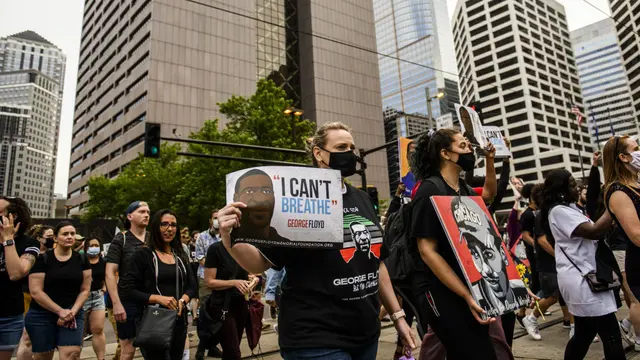Editor's note:* Bradley Blankenship is a Prague-based American journalist, political analyst and freelance reporter. The article reflects the author's opinions and not necessarily the views of CGTN.*
Exactly one year ago, on May 25, 2020, an unarmed Black man named George Floyd was killed by white Minneapolis police officer Derek Chauvin. Though, sadly, this incident was not particularly unique since American police officers routinely kill unarmed Black people, Floyd's high-profile murder shook the world and changed the entire conservation of race forever.
The murder of Floyd, who was pinned under Chauvin's knee for nine minutes and 29 seconds while he begged for his life, was so callous and despicable that it was virtually impossible for anyone not to feel sympathy. It was a perfect reminder of how terrible systemic racism and wanton violence against people of color actually are, even if many of their effects go unseen or unspoken by society writ large.
George Floyd thus became the symbol of an international movement against racism in all its forms. Anti-racist protests flowed from the United States to virtually every corner of the world, especially in Europe where many countries, like the United Kingdom, Belgium and France, were struck with their own brutal colonial pasts and racist presents.
Even in the Czech Republic, which was not a colonial power, Romani activists were at the center of anti-racist protests here because their own experience so closely resembles the Black experience in America. Other peoples in other countries across the world have found common cause with Black Americans.
In this way, the murder of George Floyd has been a wake-up call to the world. Though the issue of race, whether that be ongoing systemic racism or colonialism, has always been framed as having already happened – that is, already over with and relegated to the history books – it's clear that this is still very much an ongoing issue. Younger generations especially seem to have internalized this in a profound way, and that's why racist symbols from the past are being disposed of and mainstream culture becoming more and more inclusive.
But Floyd's murder has also been accompanied by more material actions, too, which has so far included his murderer actually being convicted and facing federal charges, clearly as one example of surely more to come; widespread police reform at the national, state and municipal levels; and large legislative plans aimed at increasing social equity.
At the same time, so far these solutions are only in their infancy and may fall short in the same familiar ways. In its own retrospective on the George Floyd murder, The New York Times recently ran a piece that, in a very clear example of the same un-systemic level thinking that so often plagues discussion of racism, insinuates that increases in violent crime are correlated with calls for police reform by anti-racist activists.
This framing obviously makes no sense on its face because it makes no sense that banning police from putting people in chokeholds, for example, would somehow lead to more violent crime. The paper tried to frame this by suggesting that police feel demoralized and are afraid to patrol minority neighborhoods in response to the protests, but this is a talking point that sounds like it came right from the police unions.
Instead, what's probably most driving violent crime is despair from the pandemic and the fact that people's livelihoods have been destroyed. It's extraordinarily well-documented in criminology that poverty is one of, if not the most, important indicator of criminal behavior and minorities have been hit especially hard from the pandemic – both directly and economically.
Since poverty among minorities is increasing, minorities typically live in cities, and violent crime is rising in cities, it suggests that we are seeing a fundamental failure in the equity of the economy. The deleterious social effects that follow from this, like increased crime, are just offshoots of this core systemic issue. And this should not surprise anyone who's been living through the COVID-19 pandemic since it's been so widely reported that the world's wealthiest have exponentially increased their wealth while the poorest have continued to slip behind.
As we move forward one year after George Floyd's tragic murder, this is the kind of systemic analysis we need when addressing issues that overlap with race. Though the conversation is moving in a much more productive direction, we have to contextualize everything from the perspective of long-standing and ever-deepening inequalities, even and especially if it means challenging the fundamental structure of our socioeconomic system.
(CGTN)
 简体中文
简体中文










